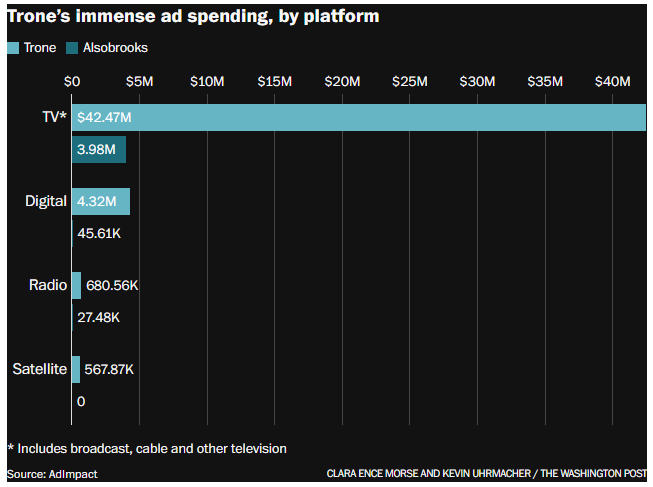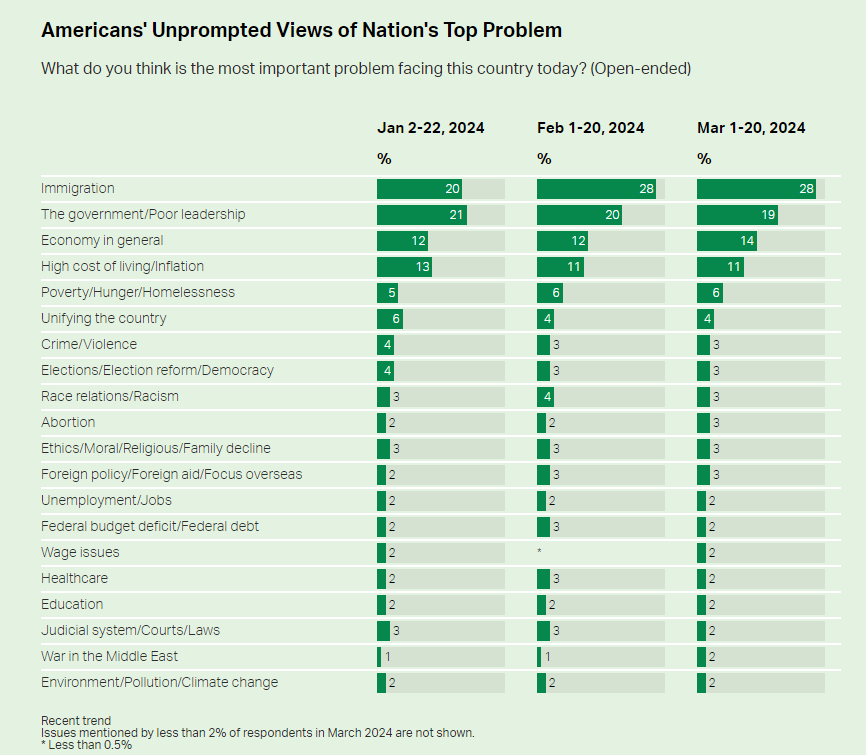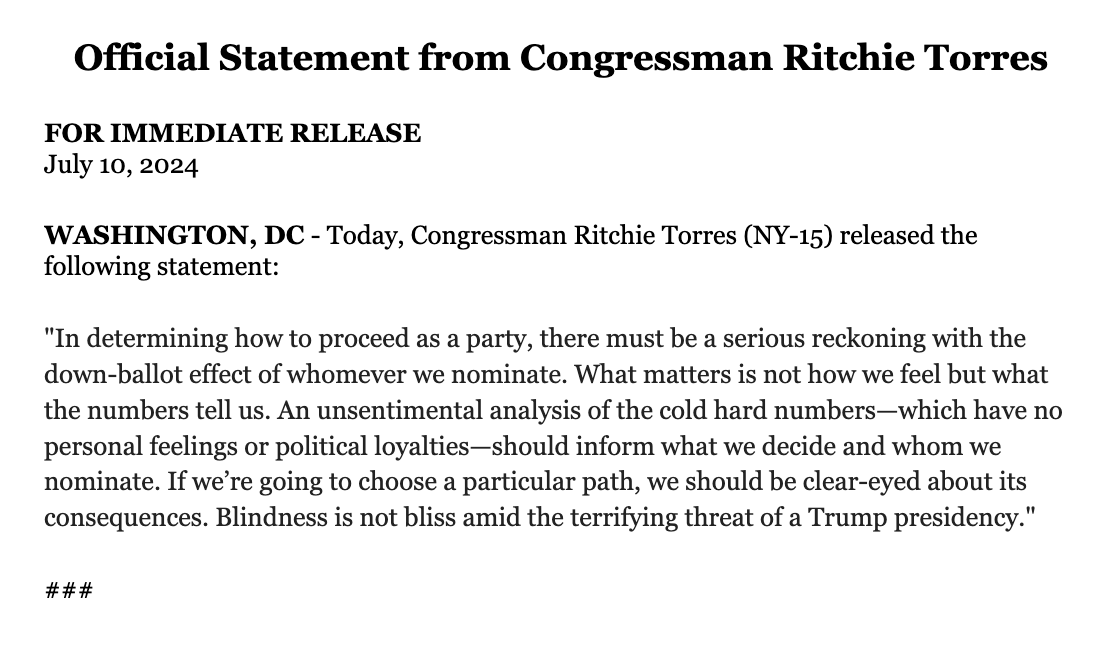The anti-Israel movement on the far-left had its highest engagement this year between protests, encampments, and online activism.
Here's a thread of how they have failed to transform that activism into electoral power and why.
Here's a thread of how they have failed to transform that activism into electoral power and why.
1) Rep. Bowman, who has demonized Israel before and after 10/7 but especially after, lost his primary to a pro-Israel Democrat.
timesofisrael.com/congressman-bo…
timesofisrael.com/congressman-bo…
2) Long-time pro-Israel Democrat Bill Pascrell represented a diverse district in New Jersey, including Paterson. Known by some residents as "little Palestine."
His opponent ran explicitly on an anti-Israel message.
Pascrell won his primary in a landslide.
His opponent ran explicitly on an anti-Israel message.
Pascrell won his primary in a landslide.

3) In deep blue California's senate primary, Adam Schiff, a pro-Israel congressman and proud Jew, ran against two Democrats well to his left on this issue.
One made it a focal point of her campaign to be hyper critical of Israel. She came in fourth.
One made it a focal point of her campaign to be hyper critical of Israel. She came in fourth.

4) Michigan made national news earlier this year as Muslim residents of Dearborn and white leftists around the state did protest voting against Biden for his support for Israel in its war against Hamas.
Last night a pro-Israel Jewish Democrat won her primary in a landslide.
Last night a pro-Israel Jewish Democrat won her primary in a landslide.

5) Rep. Cori Bush is a proponent of BDS. She has repeatedly criticized Israel since at least 2021 for defending itself against Hamas. She joins anti-Israel protestors since 10/7 at their rallies.
She lost to a pro-Israel candidate in her primary last night.
She lost to a pro-Israel candidate in her primary last night.

Why is all of this happening? The anti-Israel movement is energized in a way it has never been in my lifetime in American politics.
A few comments.
A few comments.
Institutional players will give you self-serving explanations that advance their agendas.
Leftist organizers will point to pro-Israel money.
Pro-Israel groups say Israel is popular with voters.
Both have a kernel of truth, but reality is always more complex.
Leftist organizers will point to pro-Israel money.
Pro-Israel groups say Israel is popular with voters.
Both have a kernel of truth, but reality is always more complex.
The anti-Israel left is extremely good at generating coverage. They are overwhelmingly in the same places people in media reside and socialize: urban areas with many college educated people who since at least 2016 are far more politically engaged than the general populace.
There is a difference, however, between being able to generate headlines and being able to transform that support and coverage into electoral power.
On the latter, they are incredibly weak. Even when they enjoy an incumbent advantage, as Bowman and Bush did.
On the latter, they are incredibly weak. Even when they enjoy an incumbent advantage, as Bowman and Bush did.
You can spend millions of dollars on elections but if you do not connect with voters, if you do not have a good narrative, if you are not making them associate you with their top issues, you are a weak candidate.
Let's look at a non-Israel related primary in Maryland.
Let's look at a non-Israel related primary in Maryland.
David Trone, a congressman from Maryland, spent $60 million of his personal fortune in a Democratic Senate Primary in Maryland. His opponent, County Executive Angela Alsobrooks, a Black woman without a personal fortune, was outspent everywhere.
She won.
She won.

Alsobrook sought and received support from her state party. She campaigned on issues that were high priority for primary voters. She had a compelling personal narrative. She focused on turnout and persuasion. She did not fixate on a foreign country that is an American ally.
I still am not sure what Alsobrook's Israel politics are, despite the enormous spend and coverage around that race. She ran an incredibly disciplined campaign and beat someone who outspent her 10 to 1.
Israel groups that write big checks sat on the sidelines of that race.
Israel groups that write big checks sat on the sidelines of that race.
More to the point, pro-Israel groups were tactical in the races they chose to fund.
As far as I am aware, they did not fund primary challengers to AOC, Ayanna Pressley, or Rashida Tlaib. They put their money towards primary challengers against weak incumbents.
As far as I am aware, they did not fund primary challengers to AOC, Ayanna Pressley, or Rashida Tlaib. They put their money towards primary challengers against weak incumbents.
Bowman was incredibly weak. He broke with Biden on major infrastructure legislation that was popular and sought after in his district. He spent the entire run up to the primary antagonizing Jewish voters, who represent ~10% of residents and even more among those who turned out.
Pro-Israel groups funded a strong challenger. A man with relationships and high name recognition in the district. Who said the right things to Jewish voters about Israel, but largely campaigned on delivering results for the district and criticizing Bowman for failing to.
In Bush's race, she had a cloud of controversy around her. There was an investigation kicked off to examine alleged misuse of campaign funds for security services that included paying her partner. She voted against the infrastructure bill. She voted against funding HBCUs.
Her inflammatory comments on Israel certainly drew the ire of Jewish voters in St. Louis and pro-Israel groups nationally, but those groups entered the race because her primary opponent was a strong one with a strong narrative and good name recognition.
Wesley Bell, who beat Rep. Bush in the primary last night, rose to prominence in Ferguson. In 2018 he beat a seven-term incumbent to become St. Louis County prosecutor.
Bell entered the race and made himself known as the pro-Israel candidate to win pro-Israel backing, but he campaigned on an assortment of issues both those he supported and his criticisms of Rep. Bush, which resonated.
Bush, like anti-Israel leftists around the country, fixated on weird things. She continued to hammer home her opposition to Israel. She continued to do inflammatory tweeting. She had no good answer on why her husband was on her payroll for security.
Both Bush and Bowman and the other candidates who run on their opposition to Israel assume that it is a high salience issue with voters. It is for pro-Israel Jewish voters and for leftists who already agree with them, but not for the general public.
Here are voters top issues when prompted and unprompted. Israel doesn't make the list on the prompted side. On the unprompted side, it makes the list for 2% of people at the height of the protests in March. That probably includes pro- and anti-Israel.




The far-left is fixated with turning Israel, an American ally, into a pariah. It makes them weird when it comes to the American electorate, which by and large doesn't focus on foreign affairs. Their fixations are their own undoing.
Beyond not being relevant to most voters, the decision of leftists to make Israel their top issue puts them at odds with a core constituency of the Democratic party: American Jews. Like Black Americans, Jewish Americans vote, donate, and volunteer disproportionate to their size.
It is political malpractice to run on issues that voters don't care about, that divide your coalition, that invite single issue groups with deep pockets to oppose you.
Anti-Israel Leftists are losing and they will continue to lose so long as Israel is their top issue.
Anti-Israel Leftists are losing and they will continue to lose so long as Israel is their top issue.
• • •
Missing some Tweet in this thread? You can try to
force a refresh







